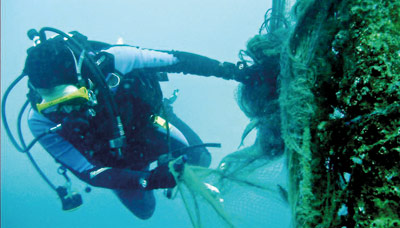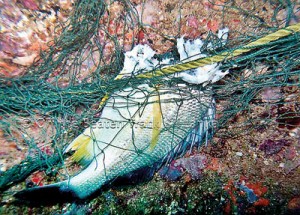News
Slow death in oceans from millions of tons of plastic waste
People concerned about the chunk of space debris expected to fall into the sea close by this Friday should be more worried about the tons of earthbound debris that enter the oceans, with Sri Lanka ranking fifth among countries releasing plastic waste into the sea.

A diver removes ghost nets. Pix by Naren Gunasekera
Marine litter affects all the world’s oceans and causes injury and death to millions of marine life such as fish, seabirds and turtles either because they become entangled in it or mistake it for prey and eat it.
Floating oceanic debris tends to accumulate at the centre of gyres (a gyre in oceanography is a large system of rotating ocean currents that draw debris into them). It is also washed ashore on coastlines.
Coastal Clean-up Day conducted in September collected a large amount of such waste that had accumulated on beaches from the north to the south of Sri Lanka and threatened to enter or re-entering the oceans as marine litter.
The cleanup was organised by the Marine Environmental Pollution Authority (MEPA) with President Maithripala Sirisena inaugurating it by collecting garbage on Galle Face beach.
The cleanup united Sri Lankans of north and south with volunteers collecting loads of solid waste and handing it over to local government authorities.
The waste levels were much higher than expected, MEPA said, calling it a successful program. Most of the rubbish consisted of non-biodegradables such as plastic bottles and polythene tops.

Fish trapped in a ghost net
Some of it could have come from countries located north of Sri Lanka such as India, Bangladesh and Indonesia on ocean currents, MEPA General Manager, marine biologist Professor Terney Pradeep Kumara revealed; large numbers of bottles and other items found on our eastern and southern coasts are not used locally.
That debris could also have resulted from the dumping of waste into the sea by ships, Dr. Pradeep Kumara said.
Referring to the arrests of 23 people a few weeks ago on charges of dumping garbage into the Kelani and Bolgoda rivers, Dr. Pradeep Kumara pointed out that with such behaviour, irrespective of a few days of beach cleaning, waste would again start accumulating on the coastline.
“It is important to address the problem at source, preventing garbage from ending up as marine litter,” he said. Solid waste dumped in our streams, rivers and canals is eventually carried into the ocean.
“Sri Lanka has a serious problem of solid waste disposal and random littering, so the country needs a comprehensive plan to address the problem at source,” Dr. Pradeep Kumara pointed out.
A recent report titled “Plastic waste inputs from land into the ocean” that placed Sri Lanka in fifth place as a polluter is based on worldwide data on solid waste, population density, and economic status for estimates of the amount of plastic going into oceans from each country.
Plastic debris ends up in the sea mainly due to inefficient waste management systems.
In 2010, eight million tons of plastic trash ended up in the ocean from coastal countries—far more than the total that has been measured floating on the surface in the ocean’s “garbage patches”. That’s the bad news.
Even worse is the news that the tonnage is on target to increase tenfold in the next decade unless the world finds a way to improve how garbage is collected and managed.
The study calculates that 275m metric tonnes of plastic waste was generated in 192 coastal countries in 2010, with 4.8-12.7m metric tonnes entering the ocean.
According to this research, published in the journal Science early this year, China tops the list of the world’s worst offenders along with five South-East Asia countries — Indonesia, the Philippines, Vietnam and Sri Lanka.
Especially damning for Sri Lanka is the fact that we have a coastline of 1,340km compared to the 14,500km coastline of fast-developing China. The United States, a country that consumes a great deal of plastic, is in 20th place.
It is difficult to measure the real amount of marine litter entering the oceans annually, the United Nations Environment Program (UNEP) says in its report, “Global Waste Management Outlook 2015”.
A recent guess was that around 10 per cent of the current yearly production of plastics could be entering the sea, an amount which was elsewhere quantified at around 18m tonnes.
The UNEP report concludes that marine debrisis rapidly emerging as one of the most difficult global waste and resource management challenges of our times.
Ocean plastic has turned up literally everywhere. It has been found in the deep ocean and buried in the Arctic ice. Greenpeace says it is being ingested with dire consequences by some 700 species of marine wildlife.
Ingestion of marine debris is known to especially affect sea turtles and seabirds but is also a problem for marine mammals and fish.“Baleen whales, when feeding, take in seawater along with plankton and plastics.
One whale was reported dead with 40kg of plastic in its intestine,” Dr. Hiran Jayewardene, an expert on marine mammals, said.
Debris ingested by marine life includes plastic bags, plastic pellets and fragments of plastic caused by the disintegration of larger items.
The biggest threat from ingestion occurs when the foreign objects block the digestive tract or fill the stomach, resulting in malnutrition, starvation and potentially death according to Greenpeace.
| Huge waste of ghost fishing Discarded or lost fishing nets and pots continue to trap and catch fish even when no longer in use. This phenomenon, known as ghost fishing, can result in the entrapment and death of large quantities of marine organisms as well as larger fish and marine mammals. The fish that get entangled in these nets are wasted, so these nets are especially damaging to the marine environment. It was reported that a single net in Puget Sound in the US is estimated to have killed more than 3,000 seabirds and fish. We lack statistics from Sri Lanka but it is assumed fish kills are high. An underwater shramadana programme by the Sub Aqua Club and Island Scuba resulted in the collection of many ghost nets caught in a shipwreck, the Medhafaru, off Colombo. Naren Gunasekera of Island Scuba said this wreck was literally a tomb for fish because of the amount of netting in and around it. Divers had to make several trips to complete their task. Divers can, of course play a part in removing the ghost nets menace but since there is a risk of entanglement, it is advisable that only experienced divers working in teams tackle this kind of operation, Mr. Gunasekera advised. |

